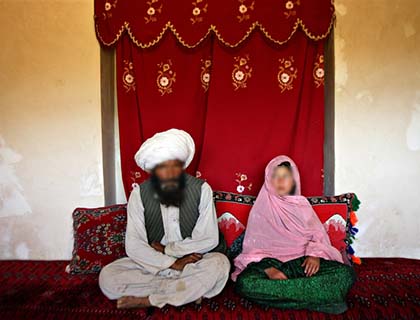KABUL - In a strongly-worded letter to President Hamid Karzai, the Human Rights Watch (HRW) on Wednesday called for immediate action to be taken against child marriage practices and domestic violence in Afghanistan. The international humanitarian group argued the persistence of the issues marked a delinquency in Afghan development that led to a number of other problematic public health and social trends.
In a 15-page briefing paper, titled "Afghanistan: Ending Child Marriage and Domestic Violence," the HRW highlighted the detrimental health and economic consequences of child marriage and violence against women and girls. The paper was based on a study carried out by HRW to investigate the effects of the practices, which have traditionally been pervasive in Afghan society but seen increasing pushback since the fall of the Taliban in 2001.
One of the explicit measures the HRW report urged President Karzai to take was the immediate implementation of the Law on Elimination of Violence Against Women (EVAW).
"His Excellency President Karzai took a very brave step in 2009 when he signed the EVAW Law. Now, it is 2013, when Karzai's term is about to end and the Law has been partially implemented. Not enough has been done," said Heather Barr, a HRW Senior Researcher. "We urge president Karzai to enforce the Law as quickly as possible."
A 2006 study by Global Rights found over 85 percent of Afghan women had reported that they had experienced physical, sexual, psychological violence or forced marriage. The survey also found that an estimated 2,000 Afghan women and girls attempted suicide by setting themselves on fire each year, which was linked to domestic violence and early or forced marriages.
The Afghan Ministry of Women Affairs (MoWA) joined HRW in highlighting the importance of the EVAW Law, citing its prohibition of child marriage, which an MoWA official said fuels violence against women.
"According to the EVAW Law, child marriage has been declared an unlawful act and that the violators of this law would be severely punished," said Muzhgan Mustafavi, Deputy Minister of Women Affairs. "Unfortunately, Afghanistan is counted among those countries where girls are sent to live with husbands at the age of eight, and this practice perpetuates violence against women."
The EVAW Law imposed tough new penalties for abuse of women, including making child marriage and forced marriage illegal under the Afghan law for the first time in the nation's history. Yet the HRW noted that child marriage still remains a common practice in Afghanistan that increases the likelihood of early pregnancy, heightening the risk of death and injury during childbirth.
The Ministry of Public Health (MoPH) released a mortality survey in 2010 that showed 53 percent of Afghan women between the ages of 25 and 49 were married by the age of 18; 12 percent of girls aged 15-19 became pregnant or gave birth; and 47 percent of deaths of women aged 20-24 were related to pregnancy. Reportedly, an Afghan woman died every two hours because of pregnancy in 2010.
In the decade since the overthrow of the Taliban government, the Afghan government has failed to take adequate measures to curtail child marriage and domestic violence, the HRW said. Bangladesh, Egypt, and Jordan among others have risen the minimum age of marriage to 18. Saudi Arabia, Bangladesh, Indonesia, and Malaysia have introduced legal reforms to combat domestic violence.
At a development donors' conference in Tokyo in July 2012, the Afghan government promised to do more to enforce the EVAW Law in return for $16 billion in pledges for future aid to Afghanistan. However, the HRW felt it has hardly lived up to that promise.
The HRW's letter urged President Karzai to initiate awareness campaigns about the harms of child marriage and domestic violence.
Earlier this year, the United Nations Assistance Mission in Afghanistan (UNAMA) and UN Women urged Afghan authorities to accelerate their efforts to implement the Law.
Head of UNAMA and Secretary-General's Special Representative for Afghanistan Jan Kubiš said, "Progress in implementing the Elimination of Violation against Women Law contributes in deterring harmful practices and protecting women from violence in their daily lives."
Mr. Kubiš added that the international community had great expectations for the Afghan government on making progress on the issues the Law addresses. He said the extent of breakthrough achieved in the EVAW Law could affect the assistance the organized provides to Afghanistan. (Tolo News)

